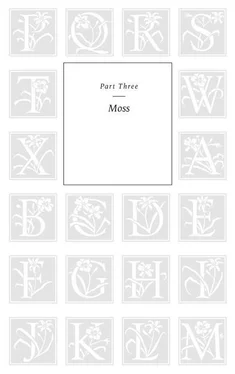Vanessa Diffenbaugh - The Language of Flowers
Здесь есть возможность читать онлайн «Vanessa Diffenbaugh - The Language of Flowers» весь текст электронной книги совершенно бесплатно (целиком полную версию без сокращений). В некоторых случаях можно слушать аудио, скачать через торрент в формате fb2 и присутствует краткое содержание. Жанр: Старинная литература, на английском языке. Описание произведения, (предисловие) а так же отзывы посетителей доступны на портале библиотеки ЛибКат.
- Название:The Language of Flowers
- Автор:
- Жанр:
- Год:неизвестен
- ISBN:нет данных
- Рейтинг книги:4 / 5. Голосов: 1
-
Избранное:Добавить в избранное
- Отзывы:
-
Ваша оценка:
- 80
- 1
- 2
- 3
- 4
- 5
The Language of Flowers: краткое содержание, описание и аннотация
Предлагаем к чтению аннотацию, описание, краткое содержание или предисловие (зависит от того, что написал сам автор книги «The Language of Flowers»). Если вы не нашли необходимую информацию о книге — напишите в комментариях, мы постараемся отыскать её.
The Language of Flowers — читать онлайн бесплатно полную книгу (весь текст) целиком
Ниже представлен текст книги, разбитый по страницам. Система сохранения места последней прочитанной страницы, позволяет с удобством читать онлайн бесплатно книгу «The Language of Flowers», без необходимости каждый раз заново искать на чём Вы остановились. Поставьте закладку, и сможете в любой момент перейти на страницу, на которой закончили чтение.
Интервал:
Закладка:
My room was empty except for three sets of clothes, my backpack, a toothbrush, hair gel, and the books Elizabeth had given me. Lying in bed the night before, I’d listened to my housemates picking through the rest of my belongings like hungry animals devouring the fallen. It was standard procedure in foster and group homes, the scouring of things left behind by rushed, weepy children. My housemates, emancipated, carried on the tradition.
It’d been years—nearly ten—since I’d participated in the scavenging, but I could still remember the thrill of finding something edible, something I could sell at school for a nickel, something mysterious or personal. In elementary school I began to collect these small, forgotten things like treasures—a silver charm with an engraved M , a watchband of fake turquoise snakeskin, a quarter-sized pillbox containing a blood-encrusted molar—stuffing them into a mesh zippered bag I’d stolen from someone’s laundry room. The objects pressed through the tiny holes of the fabric as the bag grew full and heavy.
For a short time I told myself I was saving these objects for their rightful owners—not to give them back but to use as bribes for food or favors if we landed again in the same home. But as it grew I began to covet my collection, telling myself the stories of each object over and over again: the time I lived with Molly, the girl who loved cats; the bunk-mate whose watch had been ripped off and arm broken; the basement apartment where Sarah learned the truth about the Tooth Fairy. My attachment to the objects was not based on any connection with the individuals. More often than not I had avoided them, ignoring their names, their circumstances, the hopes they had for their futures. But over time the objects came to read like a string of clues to my past, a path of bread crumbs, and I had a vague sense of wanting to follow them back to the place before my memories began. Then, in a rushed, chaotic placement change, I’d been forced to leave the bag behind. For years afterward I’d refused to pack up my belongings, arriving at each new foster home stubbornly empty-handed.
Quickly, I began to dress: two tank tops followed by three T-shirts and a hooded sweatshirt, brown stretch pants, socks, and shoes. My brown wool blanket would not fit in my backpack, so I folded it in half, wrapped it around my waist, and secured a pleat with a safety pin at each inch. The bottom I gathered and pinned in bunches like a formal petticoat, covering the whole thing with two skirts of varying lengths, the first long and lacy orange, the second A-line and burgundy. I studied myself in the bathroom mirror as I brushed my teeth and washed my face, satisfied to see that I was neither attractive nor repulsive. My curves were well hidden beneath my clothing, and the extra-short haircut I’d given myself the night before made my bright blue eyes—the only remarkable feature on an otherwise ordinary face—look uncannily large, almost frightening in their dominance of my face. I smiled into the mirror. I didn’t look homeless. Not yet, at least.
I paused in the doorway of my empty room. Sunlight shone off the white walls. I wondered who would come next, and what they’d think of the weeds sprouting from the carpet near the foot of the bed. If I had thought of it, I would have left the new girl a milk jug full of fennel. The feathery plant and licorice-sweet smell would have been a comfort. But it was too late. I nodded goodbye to the room that would no longer be mine, feeling a sudden gratitude for the angle of the sun, the locking door, the brief offering of time and space.
I hurried into the living room. Through the window I saw Meredith’s car already in the driveway, the engine off. She studied her reflection in the rearview mirror, her hands clutching the steering wheel. Spinning around, I snuck out the back door and onto the first bus that passed.
I never saw Meredith again.
4 .
From the brewery at the bottom of the hill, steam rose smokelike into the sky day and night. I watched the spread of white while I weeded, the image infusing my contentment with an edge of despair.
November in San Francisco was mild, McKinley Square quiet. My garden, except for a sensitive matilija poppy, survived the transplant, and for the first twenty-four hours I imagined I could be satisfied with an anonymous life, hidden in the safety of the trees. I listened as I worked, prepared to run at the sound of footsteps, but no one wandered off the manicured lawn, no one poked a curious face into the forest where I crouched. Even the playground was empty except for a fifteen-minute window before school, when closely monitored children swung (one, two, three times) before continuing down the hill. By the third day, I could match the children’s voices with their names. I knew who listened to their mother (Genna), who was loved by their teacher (Chloe), and who would rather be buried alive in the sandbox than sit through another day of class (Greta, little Greta; if my asters had been in bloom, I would have left her a bucketful in the sandbox, so desolate was the voice that begged her mother to let her stay). The families couldn’t see me, and I couldn’t see them, but as the days passed I began to look forward to their visits. I spent the early mornings thinking about which child I would have been most like, had I had a mother to walk me to school every morning. I imagined myself obedient instead of defiant, quick to smile instead of sullen. I wondered if I would still love flowers, if I would still crave solitude. Questions, unanswerable, swirled like water at the roots of my wild geraniums, which I soaked deeply and often.
When my hunger grew to the point of distraction, I climbed onto buses and rode to the Marina, Fillmore Street, or Pacific Heights. I toured high-end delis, lingering at polished marble countertops and sampling an olive, a slice of Canadian bacon, or a sliver of Havarti. I asked the questions Elizabeth would have asked: which olive oils were unfiltered; exactly how “fresh” was the albacore, the salmon, the sole; how sweet were the season’s first blood oranges? I accepted additional samples, feigned indecision. Then, when the attendant turned to another customer, I walked out the door.
Afterward, my hunger barely appeased, I wandered the hills, looking for plants to add to my growing garden. I searched private yards as often as public parks, slipping beneath canopies of morning glory and passionflower. On the rare occasion I settled near a plant I could not identify, I pinched a stem and carried it quickly to a crowded restaurant, where I waited for a customer to leave before taking my place at her table. Sitting before abandoned plates of half-eaten lasagna or risotto, I placed the distressed bud in a sweating water glass, its weakened green neck drooping against the lip of the glass. As I ate small, saucy bites, I thumbed through my field guide, studying the parts of the plant and answering questions methodically: Petals numerous or not apparent? Leaves swordlike, emerging from one another, or heart-shaped? Plant with copious milky juice, ovary hanging to one side of flower, or without milky juice, ovary erect? When I had deduced the plant family and memorized its common and scientific name, I pressed the flower between the pages and looked around, hoping to find another half-empty plate.
The third night, sleep evaded me. My empty stomach churned, and for the first time, my flowers offered no reassurance. Instead, the dark floral silhouettes were reminders of the time I’d had to look for a job, the time I’d been given to start a new life. I pulled my blanket tighter around my head and closed my eyes, drifting in and out of consciousness, refusing to think about what I would do when the next day arrived, or the day after that.
Читать дальшеИнтервал:
Закладка:
Похожие книги на «The Language of Flowers»
Представляем Вашему вниманию похожие книги на «The Language of Flowers» списком для выбора. Мы отобрали схожую по названию и смыслу литературу в надежде предоставить читателям больше вариантов отыскать новые, интересные, ещё непрочитанные произведения.
Обсуждение, отзывы о книге «The Language of Flowers» и просто собственные мнения читателей. Оставьте ваши комментарии, напишите, что Вы думаете о произведении, его смысле или главных героях. Укажите что конкретно понравилось, а что нет, и почему Вы так считаете.












